Diesel Engine
Generator Set

On the afternoon of the 12th,a specially planned in-depth dialogue session titled"Seven Swords Forum:Diesel Generator Adaptation and Pain Points in Large-Scale Data Centers"was held at the N1 Hall of the Shanghai New International Expo Center.The event focused on the topic of power resilience assurance in large-scale data centers and featured a deep dialogue with invited experts including Liu Xuechao,CDCC Technical Committee Member&GDS Diesel Generator System Technical Expert;Jiang Xiaojun,Director of the Energy Technology Research Center at China Communications Construction Technology Consulting;Zhao Dexiu,CDCC Technical Committee Member&Cummins Power Business Application Engineering Director;Zhang Qiang,Sales and Industrial Power Senior Manager at Changzhou Rehlko Power Equipment Co.,Ltd;Zhang Yukui,Technical Director of Data Center Power Solutions at Weichai Power Electric Power Headquarter Company;Tian Shulin,Data Center Sales Director at Shangchai Power;and Li Yuwang,President of Googol Power.
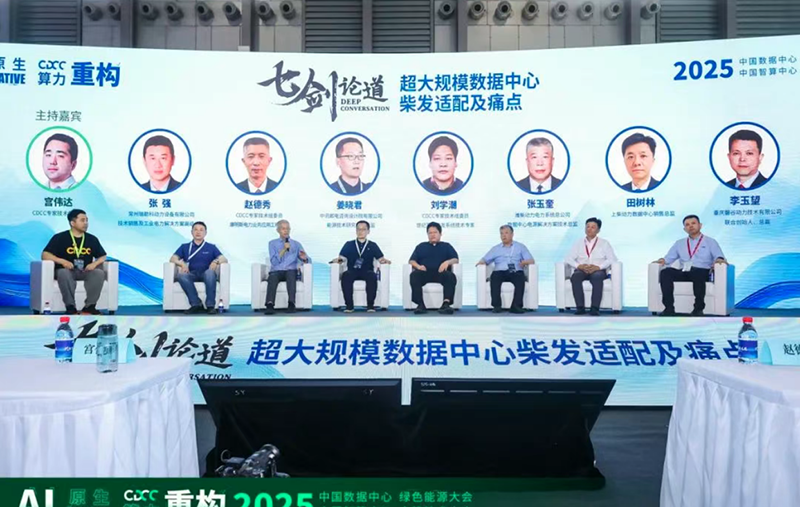
The dialogue centered on two core issues:first,the systemic challenges faced in the adaptation of diesel generator systems for large-scale data centers;and second,how diesel generator systems can efficiently and accurately respond to rapidly changing load demands in high-density computing scenarios.
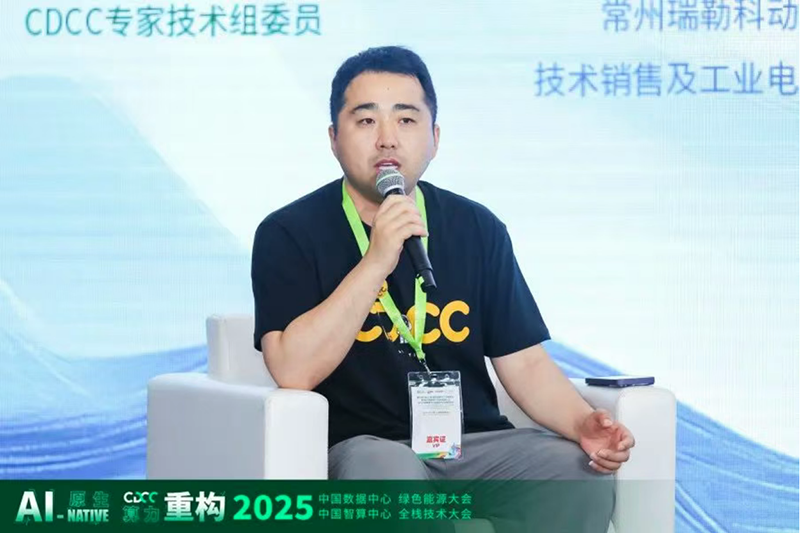
Regarding the question of whether the power of high-horsepower diesel generators is sufficient and adaptable given the continuous expansion of data center scale,the participants agreed that the exhaust volume of the engine largely determines whether the output power is sufficient.At the same time,there needs to be a unified standard for power ratings across manufacturers.From the perspective of domestic data center construction and operation companies,DCP(Data Center Power for diesel generators)is a better choice between COP(Continuous Operating Power)and PRP(Prime Power).Additionally,whether the single-unit power of diesel generators should be significantly increased must consider factors such as unit cost,equipment vibration,stacking load-bearing capacity,potential resonance during multi-unit multi-layer stacking operation,and industrial support.When discussing the issue of mutual interference in air intake and exhaust for multi-unit multi-layer stacked diesel generators,Li Yuwang suggested that the practice of remote radiators in the industrial field is worth referencing and discussing.
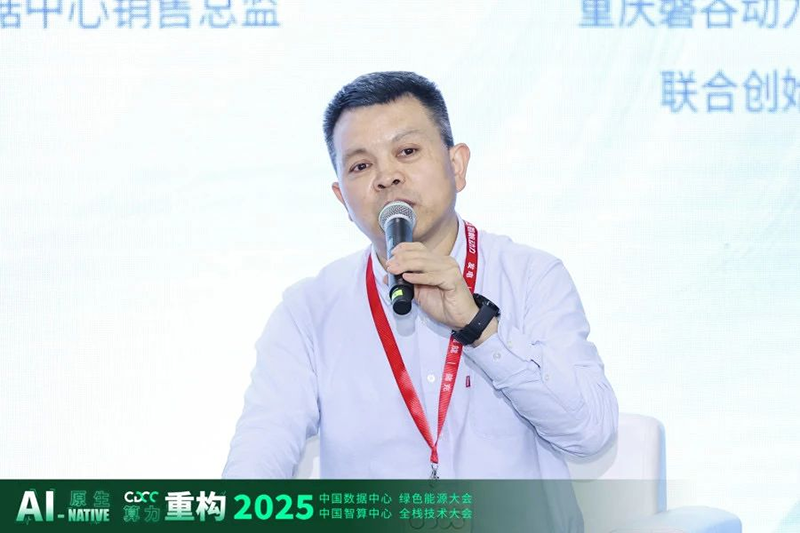
Li Yuwang stated that Googol insists on designing diesel engines for data centers with large displacement and a power-to-volume ratio below 30kW/L to ensure sufficient power output margin.Googol's D-type engines are rated with DCP power equal to PRP power.Meanwhile,Googol believes that,given the increasing power demands of AIDC,the current single-unit power of diesel generators at 1800kW,2000kW,and 2200kW will increase to 2500kW or even higher under cost-friendly conditions.Googol's Q-series 20V engine,with a displacement of 107.5 liters and a weight of only 7.2 tons,is adapted for DCP power of 2400kW/2500kW/2700kW.The weight of a 10.5kV diesel generator set is around 21 tons.Electrical and container solutions can be fully supported.The Q-series platform will launch higher-power engines to match even larger single-unit diesel generator sets.From an industry perspective,overseas markets are already seeking such solutions in bulk,and larger-power diesel generators will gradually become mainstream in the industry.
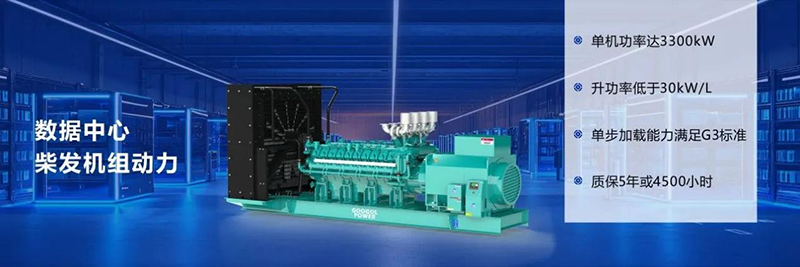
Against the backdrop of"decentralized power supply"and"highly flexible architecture"becoming industry trends,the participants unanimously agreed on the topic of whether diesel generators would be replaced in data centers.Diesel generators have irreplaceable advantages for a long time to come.First,current alternative solutions in China,such as energy storage,photovoltaic,and wind power,are inferior to diesel generators in terms of investment cost,construction area,and utilization effectiveness(partially constrained by natural resource conditions).Second,as an independent power generation unit,diesel generators have strong power generation capability,system reliability,and simplicity in complex environments,with diesel fuel offering high energy density and relative stability.While it may not be the perfect solution for data center power resilience assurance,it remains the optimal solution for now.Finally,the comprehensive utilization of diesel generators must be considered,such as connecting to the municipal grid for power generation.
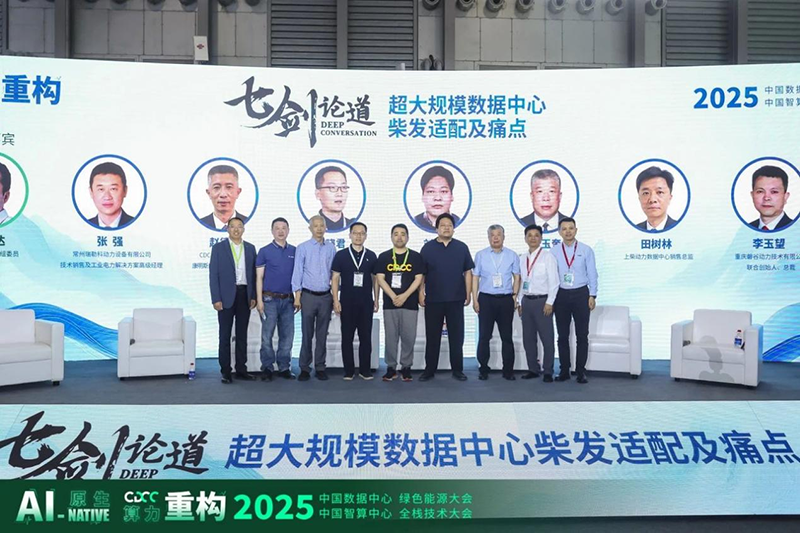
Regarding the existing national standards requiring single-unit diesel generators to meet transient response and frequency fluctuations,while data centers currently require parallel operation,demanding that diesel generators be performance-rated as a whole,and how to address load fluctuations brought by large-scale GPUs,the experts provided solutions from the electrical perspective and key technical indicators of diesel generator systems,including power supply reliability,rapid start-up capability,dynamic response speed,and system cascade control capability.Zhang Yukui believes that for precise coordination and complex control,the ECU needs to accurately control fuel injection timing and pressure,which is an advantage of high-pressure common rail products.Li Yuwang added that,aside from solving the problem from an electrical perspective,the engine,as the core power output of the diesel generator set,remains most critical.When selecting diesel generator sets,considering the power reserve margin of the engine ensures ease in handling frequent load fluctuations.
Against the background of continuously expanding data center scale,the technical capability boundaries of diesel generators as power resilience assurance for data centers are being redefined.This technical discussion focused on"how to build a solid power foundation for large-scale computing power"not only provided the industry with new perspectives but also pointed out feasible paths for engineering practice.Googol will also follow the path co-created by industry experts to ensure that its Q-series products for data centers better adapt to the current and future five-year demands for diesel generator systems in data centers.